Media choices…
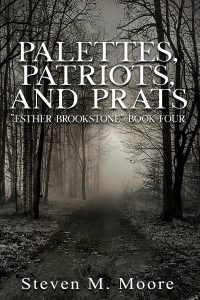 Some authors, aspiring or “old hands,” might have read my little guide “Writing Fiction” (available on the “Free Stuff & Contests” web page as a free PDF download); its advice differs from that so often given by who’s so often called “writing gurus,” because I say it like it is, and so many so-called gurus are generally full of it! You want some agent to secure for you a big publishing contract with a major Big Five publisher? Rarely happens—agents and traditional publishers generally can’t recognize storytelling any better than the average reader! First person stories are doomed? Tell that to Andy Weir! Indie authors make no money? Ask Hugh Howey or A. G. Riddle! You have to be too damn lucky to have any success writing fiction? I’ll agree with that, although I’ve been banned from a discussion group for saying it: It’s on a par with winning the lottery, but you can’t win if you don’t play!
Some authors, aspiring or “old hands,” might have read my little guide “Writing Fiction” (available on the “Free Stuff & Contests” web page as a free PDF download); its advice differs from that so often given by who’s so often called “writing gurus,” because I say it like it is, and so many so-called gurus are generally full of it! You want some agent to secure for you a big publishing contract with a major Big Five publisher? Rarely happens—agents and traditional publishers generally can’t recognize storytelling any better than the average reader! First person stories are doomed? Tell that to Andy Weir! Indie authors make no money? Ask Hugh Howey or A. G. Riddle! You have to be too damn lucky to have any success writing fiction? I’ll agree with that, although I’ve been banned from a discussion group for saying it: It’s on a par with winning the lottery, but you can’t win if you don’t play!
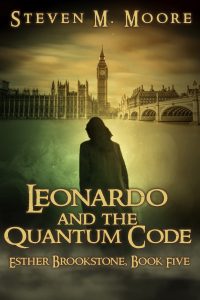 A smart author today gives the middle finger to the whole traditional publishing universe and opts to self-publish, at least in some form, but the question a new author thinking about self-publishing might have is an important one: What media should I use? Today’s authors, self- or traditionally published, have various choices of media. (Okay, traditional publishers force theirs upon you, but you should know what those might be.) Even paper has three versions: hardbound, trade paperback, or airport-style paperback. There are also audiobooks and ebooks. Which media should be chosen depends on who your readers might be (and not who traditional publishers want them to be!). Many older readers (probably too set in their ways, especially concerning ecological choices) prefer paper, but even they might balk at hardbound prices, especially if they only read a book once and then have to find a place on the shelf for it. (Despite what most so-called gurus claim, most fiction readers only read a book once; but they might keep it around for other family members and friends, a “soft version” of book piracy.)
A smart author today gives the middle finger to the whole traditional publishing universe and opts to self-publish, at least in some form, but the question a new author thinking about self-publishing might have is an important one: What media should I use? Today’s authors, self- or traditionally published, have various choices of media. (Okay, traditional publishers force theirs upon you, but you should know what those might be.) Even paper has three versions: hardbound, trade paperback, or airport-style paperback. There are also audiobooks and ebooks. Which media should be chosen depends on who your readers might be (and not who traditional publishers want them to be!). Many older readers (probably too set in their ways, especially concerning ecological choices) prefer paper, but even they might balk at hardbound prices, especially if they only read a book once and then have to find a place on the shelf for it. (Despite what most so-called gurus claim, most fiction readers only read a book once; but they might keep it around for other family members and friends, a “soft version” of book piracy.)
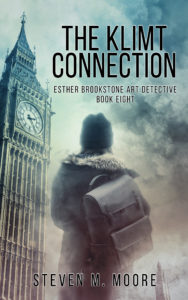 Ebooks are popular with younger readers (and older ones like me who prefer to save our forests!), but traditionally published ebooks are almost as expensive as paper versions, especially trade paperbacks, so why not buy a paper version?
Ebooks are popular with younger readers (and older ones like me who prefer to save our forests!), but traditionally published ebooks are almost as expensive as paper versions, especially trade paperbacks, so why not buy a paper version?
Audiobooks have a limited audience: commuters, walkers, and riders who don’t mind buds in their ears (even if using them means they might be killed by a wild driver?). A traditional publisher might spring for a good reading voice—that’s a requirement—but a self-published author generally can’t afford one (unless they sound like Idris Elba, they should never read their own work!).
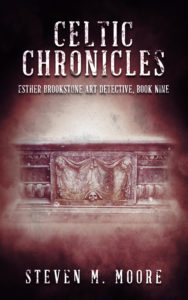 So, assuming an author makes the right choice and self-publishes (my little guide mentioned above explains how to use Draft2Digital to publish low-cost ebooks), there are only two practical choices for media, paperback and ebook; and, if you’re only going to choose one, choose ebook. Those readers insisting on a print version will read an ebook if they’re true fans.
So, assuming an author makes the right choice and self-publishes (my little guide mentioned above explains how to use Draft2Digital to publish low-cost ebooks), there are only two practical choices for media, paperback and ebook; and, if you’re only going to choose one, choose ebook. Those readers insisting on a print version will read an ebook if they’re true fans.
As time goes on, though, your media choices will become irrelevant, of course. How much longer will it be before there are no readers? Why would anyone bother to tell stories in that case? Of course, storytelling is a quintessentially human activity (despite idiots who claim that AIs can do it just as well), so that would be a sad day for all humankind!
***
Comments are always welcome! (Please follow the rules found on the “Join the Conversation” web page.)
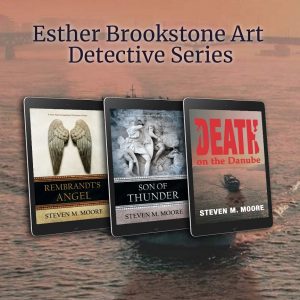 The “Esther Brookstone Art Detective” series. This series is an example of mixed media. The first two novels, Rembrandt’s Angel and Son of Thunder, were published in both trade paperback and ebook formats, the media used determined by Penmore Press, a traditional publisher. They balked at publishing the third book, Death on the Danube, so I self-published it, again in both media formats. The remaining six novels are either available as low-cost ebooks or free downloadable PDFs (the latter, a media choice not mentioned above but ideal for freebies). The entire series leads into the “Inspector Steve Morgan” trilogy, so it involves twelve novels. That should keep any fan of mystery and thriller stories with a British flavor happy for a long time! Where should you start? Try Defanging the Red Dragon or Intolerance, the two free downloadable PDFs. (You’ll find them in the list of freebies on the “Free Stuff & Contests” web page along with many other free downloadable PDFs, including my little guide “Writing Fiction.”)
The “Esther Brookstone Art Detective” series. This series is an example of mixed media. The first two novels, Rembrandt’s Angel and Son of Thunder, were published in both trade paperback and ebook formats, the media used determined by Penmore Press, a traditional publisher. They balked at publishing the third book, Death on the Danube, so I self-published it, again in both media formats. The remaining six novels are either available as low-cost ebooks or free downloadable PDFs (the latter, a media choice not mentioned above but ideal for freebies). The entire series leads into the “Inspector Steve Morgan” trilogy, so it involves twelve novels. That should keep any fan of mystery and thriller stories with a British flavor happy for a long time! Where should you start? Try Defanging the Red Dragon or Intolerance, the two free downloadable PDFs. (You’ll find them in the list of freebies on the “Free Stuff & Contests” web page along with many other free downloadable PDFs, including my little guide “Writing Fiction.”)
Around the world and to the stars! In libris libertas!
